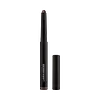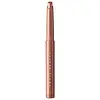What's inside
What's inside
 Key Ingredients
Key Ingredients

 Benefits
Benefits

 Concerns
Concerns

 Ingredients Side-by-side
Ingredients Side-by-side

Dimethicone
EmollientTrimethylsiloxysilicate
EmollientMica
Cosmetic ColorantSilica
AbrasiveSynthetic Wax
AbrasivePolyethylene
AbrasiveDicalcium Phosphate
AbrasiveStearoxymethicone/Dimethicone Copolymer
EmollientStearyl Dimethicone
EmollientCaprylyl Methicone
Skin ConditioningCalcium Sodium Borosilicate
Disteardimonium Hectorite
StabilisingOctadecene
SolventCopernicia Cerifera Wax
Polysilicone-11
Propylene Carbonate
SolventCaprylic/Capric Triglyceride
MaskingPentaerythrityl Tetra-Di-T-Butyl Hydroxyhydrocinnamate
AntioxidantPolyhydroxystearic Acid
EmulsifyingMaltodextrin
AbsorbentBrassica Campestris Seed Oil
Skin ConditioningRicinus Communis Seed Oil
MaskingSodium Hyaluronate
HumectantHydrogenated Castor Oil
EmollientPolygonum Tinctorium Leaf Extract
Skin ConditioningRubus Idaeus Leaf Extract
Skin ConditioningBHT
AntioxidantCI 77891
Cosmetic ColorantIron Oxides
CI 42090
Cosmetic ColorantCI 77742
Cosmetic ColorantCI 75470
Cosmetic ColorantDimethicone, Trimethylsiloxysilicate, Mica, Silica, Synthetic Wax, Polyethylene, Dicalcium Phosphate, Stearoxymethicone/Dimethicone Copolymer, Stearyl Dimethicone, Caprylyl Methicone, Calcium Sodium Borosilicate, Disteardimonium Hectorite, Octadecene, Copernicia Cerifera Wax, Polysilicone-11, Propylene Carbonate, Caprylic/Capric Triglyceride, Pentaerythrityl Tetra-Di-T-Butyl Hydroxyhydrocinnamate, Polyhydroxystearic Acid, Maltodextrin, Brassica Campestris Seed Oil, Ricinus Communis Seed Oil, Sodium Hyaluronate, Hydrogenated Castor Oil, Polygonum Tinctorium Leaf Extract, Rubus Idaeus Leaf Extract, BHT, CI 77891, Iron Oxides, CI 42090, CI 77742, CI 75470
Trisiloxane
Skin ConditioningMica
Cosmetic ColorantTrimethylsiloxysilicate
EmollientDimethicone
EmollientPhenylpropyldimethylsiloxysilicate
EmollientPolyethylene
AbrasiveSynthetic Wax
AbrasiveC20-24 Alkyl Dimethicone
Skin ConditioningDiisostearyl Malate
EmollientSilica
AbrasiveLauroyl Lysine
Skin ConditioningSynthetic Fluorphlogopite
Caprylic/Capric Triglyceride
MaskingPolyhydroxystearic Acid
EmulsifyingStearalkonium Hectorite
Gel FormingPentaerythrityl Tetra-Di-T-Butyl Hydroxyhydrocinnamate
AntioxidantPropylene Carbonate
SolventIsostearic Acid
CleansingLecithin
EmollientPolyglyceryl-3 Polyricinoleate
EmulsifyingTin Oxide
AbrasiveDicalcium Phosphate
AbrasiveCI 77000
Cosmetic ColorantCI 77491
Cosmetic ColorantCI 77891
Cosmetic ColorantTrisiloxane, Mica, Trimethylsiloxysilicate, Dimethicone, Phenylpropyldimethylsiloxysilicate, Polyethylene, Synthetic Wax, C20-24 Alkyl Dimethicone, Diisostearyl Malate, Silica, Lauroyl Lysine, Synthetic Fluorphlogopite, Caprylic/Capric Triglyceride, Polyhydroxystearic Acid, Stearalkonium Hectorite, Pentaerythrityl Tetra-Di-T-Butyl Hydroxyhydrocinnamate, Propylene Carbonate, Isostearic Acid, Lecithin, Polyglyceryl-3 Polyricinoleate, Tin Oxide, Dicalcium Phosphate, CI 77000, CI 77491, CI 77891
 Reviews
Reviews

Ingredients Explained
These ingredients are found in both products.
Ingredients higher up in an ingredient list are typically present in a larger amount.
This ingredient is an emollient, solvent, and texture enhancer. It is considered a skin-softener by helping the skin prevent moisture loss.
It helps thicken a product's formula and makes it easier to spread by dissolving clumping compounds.
Caprylic Triglyceride is made by combining glycerin with coconut oil, forming a clear liquid.
While there is an assumption Caprylic Triglyceride can clog pores due to it being derived from coconut oil, there is no research supporting this.
Learn more about Caprylic/Capric TriglycerideCi 77891 is a white pigment from Titanium dioxide. It is naturally found in minerals such as rutile and ilmenite.
It's main function is to add a white color to cosmetics. It can also be mixed with other colors to create different shades.
Ci 77891 is commonly found in sunscreens due to its ability to block UV rays.
Learn more about CI 77891Dicalcium Phosphate is an exfoliant.
Dimethicone is a type of synthetic silicone created from natural materials such as quartz.
What it does:
Dimethicone comes in different viscosities:
Depending on the viscosity, dimethicone has different properties.
Ingredients lists don't always show which type is used, so we recommend reaching out to the brand if you have questions about the viscosity.
This ingredient is unlikely to cause irritation because it does not get absorbed into skin. However, people with silicone allergies should be careful about using this ingredient.
Note: Dimethicone may contribute to pilling. This is because it is not oil or water soluble, so pilling may occur when layered with products. When mixed with heavy oils in a formula, the outcome is also quite greasy.
Learn more about DimethiconeMica is a naturally occurring mineral used to add shimmer and color in cosmetics. It can also help improve the texture of a product or give it an opaque, white/silver color.
Serecite is the name for very fine but ragged grains of mica.
This ingredient is often coated with metal oxides like titanium dioxide. Trace amounts of heavy metals may be found in mica, but these metals are not harmful in our personal products.
Mica has been used since prehistoric times throughout the world. Ancient Egyptian, Indian, Greek, Roman, Aztec, and Chinese civilizations have used mica.
Learn more about MicaPentaerythrityl Tetra-Di-T-Butyl Hydroxyhydrocinnamate (long name, huh?) is a synthetic antioxidant.
It is used to help stabilize other antioxidants or prevent the color from changing in a product.
As an antioxidant, it helps fight free-radical molecules. Free-radical molecules are capable of damaging our cells and other genetic material. Thus, antioxidants may reduce the signs of aging.
This ingredient is oil-soluble.
Learn more about Pentaerythrityl Tetra-Di-T-Butyl HydroxyhydrocinnamatePolyethylene is a synthetic ingredient that helps the skin retain moisture. It is a polymer.
It is also typically used within product formulations to help bind solid ingredients together and thicken oil-based ingredients. When added to balms and emulsions, it helps increase the melting point temperature.
Polyhydroxystearic Acid is a soft wax made from castor oil.
It is is a texture thickener, emulsifier, and film-former. Emulsifiers prevent ingredients from separating, such as oils and waters.
Polyhydroxystearic Acid may not be fungal acne safe.
Learn more about Polyhydroxystearic AcidThis ingredient is a solvent. It helps dissolve active ingredients and alter the texture of products.
Propylene Carbonate is commonly used in makeup and with clay, such as montmorillonite or bentonite.
Studies show this ingredient to be safe for cosmetics. When it is undiluted, it can cause skin irritation. (It is always diluted in skincare and makeup). This ingredient is water-soluble.
Propylene Carbonate is created from propylene glycol and carbonic acid.
Learn more about Propylene CarbonateSilica, also known as silicon dioxide, is a naturally occurring mineral. It is used as a fine, spherical, and porous powder in cosmetics.
Though it has exfoliant properties, the function of silica varies depending on the product.
The unique structure of silica enhances the spreadability and adds smoothness, making it a great texture enhancer.
It is also used as an active carrier, emulsifier, and mattifier due to its ability to absorb excess oil.
In some products, tiny microneedles called spicules are made from silica or hydrolyzed sponge. When you rub them in, they lightly polish away dead skin layers and enhance the penetration of active ingredients.
Learn more about SilicaSynthetic Wax is created from fossil fuels such as natural gas. It is used to enhance texture, adjust pH, and as an occlusive.
It may also be used as an abrasive ingredient to exfoliate the skin.
Synthetic Wax may not be fungal acne safe.
Learn more about Synthetic WaxThis silicone is an emollient. Emollients create a thin film on the skin to prevent moisture from escaping.
It is not soluble in water and helps increase water-resistance in products.
According to a manufacturer, it can blend seamlessly with silicone oils, such as Cyclopentasiloxane.
Learn more about Trimethylsiloxysilicate